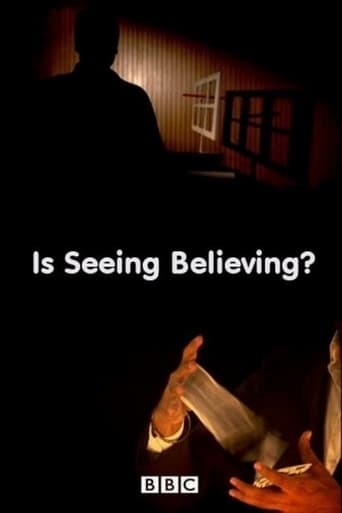BBC Horizon: Is Seeing Believing
Horizon explores the strange and wonderful world of illusions - and reveals the tricks they play on our senses and why they fool us. We show how easy it is to trick your sense of taste by changing the colours of food and drink, explain how what you see can change what you hear, and see just how unreliable our sense of colour can be. But all this trickery has a serious purpose. It's helping scientists to create a new understanding of how our senses work - not as individual senses, but connected together. It holds the intriguing possibility that one sense could be mapped into another. This is what happened to Daniel Kish, who lost his sight as a child. He is now able to create a vision of the world by clicking his tongue which allows him to echolocate like a bat. And in a series of MRI scans, scientists are now looking to find out if Daniel's brain may have actually rewired itself enabling him to use sound to create a visual image of the world. Horizon explores the strange and wonderful world of illusions - and reveals the tricks they play on our senses and why they fool us. We show how easy it is to trick your sense of taste by changing the colours of food and drink, explain how what you see can change what you hear, and see just how unreliable our sense of colour can be. But all this trickery has a serious purpose. It's helping scientists to create a new understanding of how our senses work - not as individual senses, but connected together. It holds the intriguing possibility that one sense could be mapped into another. This is what happened to Daniel Kish, who lost his sight as a child. He is now able to create a vision of the world by clicking his tongue which allows him to echolocate like a bat. And in a series of MRI scans, scientists are now looking to find out if Daniel's brain may have actually rewired itself enabling him to use sound to create a visual image of the world. Horizon explores the strange and wonderful world of illusions - and reveals the tricks they play on our senses and why they fool us. We show how easy it is to trick your sense of taste by changing the colours of food and drink, explain how what you see can change what you hear, and see just how unreliable our sense of colour can be. But all this trickery has a serious purpose. It's helping scientists to create a new understanding of how our senses work - not as individual senses, but connected together. It holds the intriguing possibility that one sense could be mapped into another. This is what happened to Daniel Kish, who lost his sight as a child. He is now able to create a vision of the world by clicking his tongue which allows him to echolocate like a bat. And in a series of MRI scans, scientists are now looking to find out if Daniel's brain may have actually rewired itself enabling him to use sound to create a visual image of the world. Horizon explores the strange and wonderful world of illusions - and reveals the tricks they play on our senses and why they fool us. We show how easy it is to trick your sense of taste by changing the colours of food and drink, explain how what you see can change what you hear, and see just how unreliable our sense of colour can be. But all this trickery has a serious purpose. It's helping scientists to create a new understanding of how our senses work - not as individual senses, but connected together. It holds the intriguing possibility that one sense could be mapped into another. This is what happened to Daniel Kish, who lost his sight as a child. He is now able to create a vision of the world by clicking his tongue which allows him to echolocate like a bat. And in a series of MRI scans, scientists are now looking to find out if Daniel's brain may have actually rewired itself enabling him to use sound to create a visual image of the world.



 AD
AD